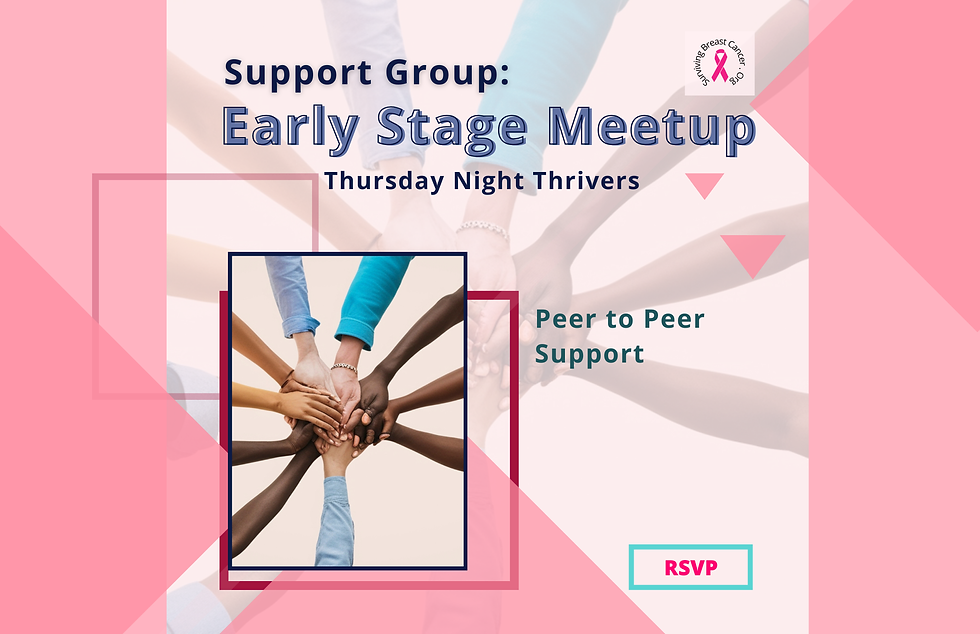Rare Forms of Breast Cancer
- Surviving Breast Cancer

- Aug 7, 2022
- 3 min read
Updated: Aug 29, 2025

Over the last month, you may have seen yellow ribbons pop up in your community, in the news, and over social media. These yellow ribbons serve as a reminder to all that July is Sarcoma Awareness Month. Sarcoma Awareness Month aims to raise awareness about a rare, and often “forgotten cancer” that begins in the connective tissues and affects 13,000 people yearly.
Sarcoma is a soft tissue cancer that is made up of many subtypes, mainly because it can emerge from many different connective tissues and can even arise in the bones. While many sarcomas are found in the connective tissue in the arms and legs, they can also emerge in the tissue that supports the ducts and lobules of the breast. Breast cancer sarcomas are very rare, but they tend to be higher grade and larger than other types of breast cancer tumors.
The cause of breast cancer sarcomas is not known, and the first symptom, like many other forms of breast cancer, is a painless lump. However, as time goes on, the lump tends to get larger and may begin to press on nerves or muscles, resulting in discomfort and difficulty breathing. Treatment for breast cancer sarcomas depends on the stage, but often, surgery is recommended to remove the tumor as well some of the soft tissue surrounding it. Although rare, breast cancer sarcomas deserve the same awareness and research as other forms of breast cancer, and sarcoma patients deserve to have their stories heard. You can help spread sarcoma awareness via social media by posting the hashtags curesarcoma and sarcomaawarenessmonth or by displaying a yellow ribbon. You can also donate to the Sarcoma Foundation of America to show your support.
Inflammatory Breast Cancer
Another rare form of breast cancer is inflammatory breast cancer (IBC). IBC begins in the soft tissue surrounding the breast and causes the lymph vessels in the skin to become blocked. This blockage results in firm, itchy, swollen, and red breasts, hence the name inflammatory. Due to its appearance, IBC is often misdiagnosed as an infection of the breast, so IBC is usually not caught and diagnosed until it is already in an advanced stage. Treatment for IBC can include chemotherapy, surgery, or radiation and the prognosis depends on the stage and location of the cancer. If IBC is localized, the five-year survival rate is around 39%. However, if the cancer has spread to other organs, the survival rate drops to 18%. Learn more about this form of cancer in our podcast episode about anticipatory grief with Ginny Mason, Executive Director at Inflammatory Breast Cancer Research Foundation.
You can raise awareness for IBC by donating to the IBC Network Foundation or Inflammatory Breast Cancer Research Foundation, or by displaying the pink, black, and orange ribbon created to symbolize hope and solidarity for women experiencing IBC.
Paget’s Disease
Paget’s disease of the breast is a rare form of breast cancer that forms in or around the nipple and is often referred to as Paget’s disease of the nipple. Symptoms start with scaling, flakiness, and redness of the skin around the nipple and can progress to tingling, burning, bleeding, or oozing discharge of the nipple. Treatment for Paget’s disease may include a mastectomy or lumpectomy, as well as radiation, chemotherapy, or hormonal therapy. And although there is no absolute way to prevent breast cancer, maintaining a healthy weight, getting regular exercise, and limiting alcohol consumption can mitigate your chances of developing breast cancer.
This story from Natalie, a survivor with multiple forms of breast cancer, includes more information about Paget's disease.
“Any mass that’s growing, certainly if it’s bigger than a golf ball, should be evaluated. If it’s a bone sarcoma, a lot of times that will change the integrity of the bones, so a limp or pain with activity,” said Dr. Matthew DiCaprio, Director of Orthopedic Oncology at Albany Medical Center. Read More.
Sarcoma of the breast is a rare malignancy with heterogeneous histology. Angiosarcoma, including secondary angiosarcoma from previous radiation, is the most common type of sarcoma of the breast. Other types of sarcomas of the breast have limited clinical and survival information. Read More.
Primary sarcoma of the breast is an extremely rare and heterogeneous disease. The rarity of this tumor limits most studies to small retrospective case reviews and case reports and has made clinicopathological study difficult.
Metaplastic Breast Cancer is a very rare form of breast cancer that originates in the milk duct of the breast before spreading to the tissue surrounding the duct. Metaplastic breast cancer accounts for less than 1% of all breast cancers, but it can also behave more aggressively.














